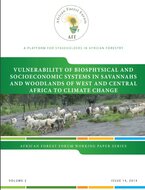Tropical woodlands and savannahs are associated with areas where there is an annual dry season of sufficient duration and intensity, and most of woody plants shed their leaves and grasses dry out. The accumulations of the dry fuel permits fires every year, and the fires help prevent complete domination by woody plants. These ecosystems are overexploited as a result of crop farming and/or overgrazing associated with fuelwood gathering. Africa is composed essentially of woodlands and savannahs with rain forests occupying 7% of the land area. They occur extensively in West and Central Africa. The woodlands and savannahs serve important ecological functions and provide wood and non-wood forest products that contribute significantly to human well-being at local, national and global levels.
The non-wood products include fruits, vegetables, nuts seeds, roots, mushroom, spices, bush meat, bee products, edible insects, eggs and medicines, which are particularly important in the lives of the communities dwelling in them. The products also play important roles in the national economies of many countries of West and Central Africa. Agriculture, i.e. crop production and animal husbandry, is the main occupation of the rural dwellers in these ecosystems that depend on the produce for subsistence and income. Much of the crop land is rain-fed and, therefore, vulnerable to climate variability that is characterized by periodic droughts and occasional floods that frequently cause crop failures during which the coping strategy of inhabitants is gathering of wild foods and resources from the vegetation. Maintaining the flow of these goods and services requires healthy ecosystems in the face of human-induced climate change. Already, scientific evidence in Africa shows that climate change directly impacts on key development sectors, such as water resources, land, forests, biodiversity, tourism and agriculture that are crucial for livelihoods, food, health and security of local communities. Furthermore, future projections indicate that these impacts are likely to worsen overtime.

